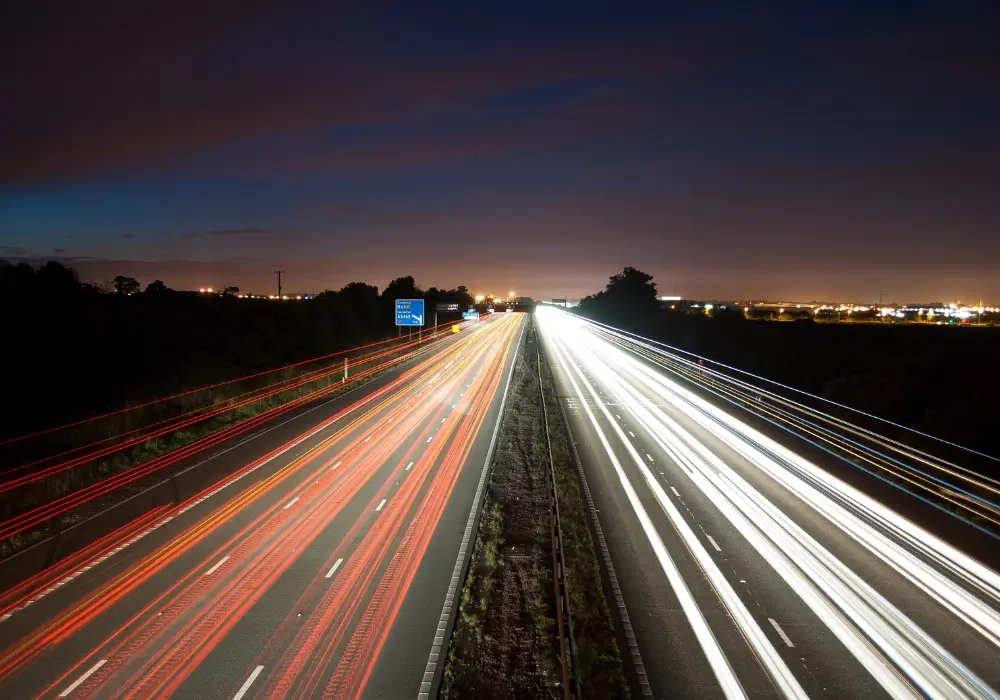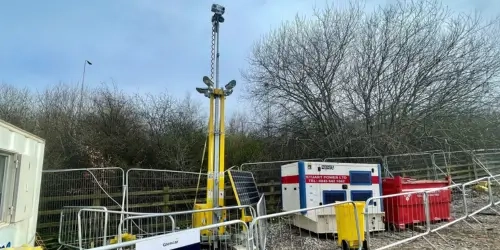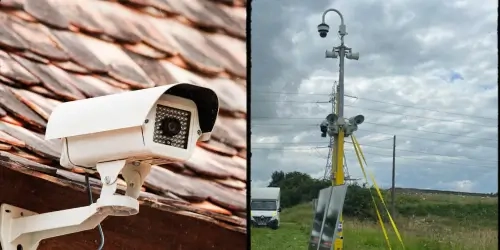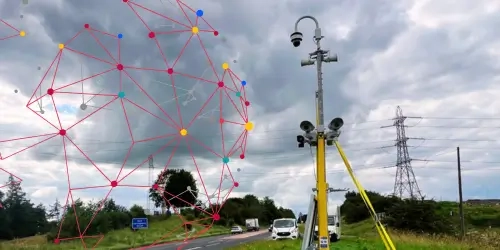High-speed roadworks face unique security challenges because their layouts and conditions are always changing. Traditional security methods often can’t keep up with the demands of these sites, leaving gaps in protection.
To reduce the risks of theft, vandalism and unauthorised access along linear sites, site managers need flexible, tailored security solutions such as mobile CCTV Towers.
In this guide, we’ll discuss traditional security vs mobile CCTV, why static guards struggle in these environments and the advantages of modern surveillance systems. By the end, you’ll know what works and what doesn't when it comes to roadwork security and how to choose the best option for keeping your site safe.
What Makes High-Speed Roadworks So Challenging to Secure?
[High-speed roadwork] security is complicated because these sites move constantly, stretch for miles and operate inches away from 50mph+ traffic.
-
Linear layouts: Roadworks aren't confined to one secure location but stretch across miles of highways and carriageways. Crews often work in narrow lines while cars fly past at highway speeds. The work zone moves forward as the job progresses, which means your security perimeter is different every single day. Add in multiple blind spots, and you're left with security gaps that fixed security systems cannot address.
-
Subpar perimeter control: Most roadwork projects rely on traffic cones or temporary barriers to corner off and secure work zones. However, these measures offer very little protection, making it easy for thieves, vandals or unauthorised persons to gain access to worksites.
-
Remote locations: Many road construction projects pass through remote areas, far from urban areas and built-up villages. Without the "natural" surveillance from nearby offices, businesses or passers-by, these sites are left exposed and unmonitored. This isolation makes them prime targets for criminal activity such as theft, vandalism and trespassing.
-
Weather conditions: Harsh weather adds another layer of difficulty to securing roadwork sites. Heavy rain reduces visibility for workers, security staff and even cameras. Strong winds can damage perimeter barriers, while the darker winter months give criminals extra cover for illicit activities.
-
Overnight risks: Most roadwork projects shut down after dark, leaving valuable equipment exposed across vast, linear sites. Traditional security systems weren't designed to monitor assets spread over this kind of distance, especially in complete darkness.
The impact of fast-moving traffic and shifting site layouts
-
Distracted drivers: Fast-moving cars create immediate dangers for onsite security personnel. Guards patrolling linear sites face increased accident risks from distracted drivers who may not expect pedestrians in construction zones.
-
High-speed vehicles: Despite lower speed limits in construction areas, drivers often fail to slow down, increasing the risk of collisions.
-
Hazardous road conditions: Road surfaces are often uneven during construction work. Loose gravel, debris and potholes can cause vehicles to skid or lose control, further heightening the risk of injury to motorists and workers.
-
Poor signage: Temporary or unclear road signs can confuse drivers, especially at night or in inclement weather. This makes it harder for drivers to navigate through roadworks safely.
-
Site changes: Because roadwork projects are always on the move, fixed security quickly becomes obsolete. A security camera positioned to monitor Monday's work area might be completely irrelevant by Wednesday when the crew has moved 500 metres down the road.
Why Static Guards Struggle in Dynamic Roadwork Environments
Static security professionals face specific challenges on roadwork sites that don't exist on traditional construction projects:
Fatigue
Long shifts near high-speed traffic wear guards down, reducing their focus and reaction times. The stress of working in such hazardous conditions can quickly lead to mistakes or lapses in attention.
Solution
Solar-powered mobile CCTV systems eliminate these risks. Operating independently of mains power, fixed broadband or human intervention, they provide 24/7 coverage for up to 20 weeks between charges, delivering surveillance that never tires.
Threat vulnerabilities
A lone guard or small team is often no match for organised crime groups or large intrusions. This leaves sites vulnerable to theft or vandalism, especially during off-hours when activity is low.
Solution
CCTV Towers equipped with smart technology, such as AI-video analytics and smart cameras, can spot and deter criminal activity from up to 200 metres away, day or night. When linked to remote monitoring centres, these smart systems send instant alerts to mobile keyholding teams as soon as suspicious behaviour is detected. This removes physical risk to on-site personnel while providing faster, more effective responses.
Costs
Hiring security guards can cost between £5,000 and £12,000 per month, with specialist security professionals commanding higher rates. Night shifts, weekend coverage and bank holiday rates increase expenses significantly. Insurance premiums also rise if a guard is injured in a traffic-related accident.
On top of that, false alarms often trigger costly emergency callouts. And when theft does occur, guards might be unable to stop it or provide the evidence needed for prosecutions.
Solution
Temporary CCTV systems offer a far more cost-effective solution, potentially saving site managers up to 88% compared to manned guards. These self-contained units deliver near-360° coverage, require minimal maintenance and automatically provide time-stamped reports when incidents occur.
Inadequate cover
A typical motorway road construction project can span 10+ miles. Even with multiple guards stationed at key points, they cannot monitor such large areas effectively. This ultimately creates security gaps and blind spots that criminals could exploit.
Solution
Traffic Management Towers, standing up to 6 metres tall, transform passive surveillance into proactive site protection. With a near-360° field of view, high-definition PTZ (Pan-Tilt-Zoom) security cameras track activity automatically and cover blind spots, detecting intruders at distances of up to 200 metres.
Designed with mobility in mind, Rapid Deployment CCTV Towers can move with your project and provide consistent coverage regardless of how site layouts change. Multiple towers can coordinate to eliminate blind spots across even the largest projects.
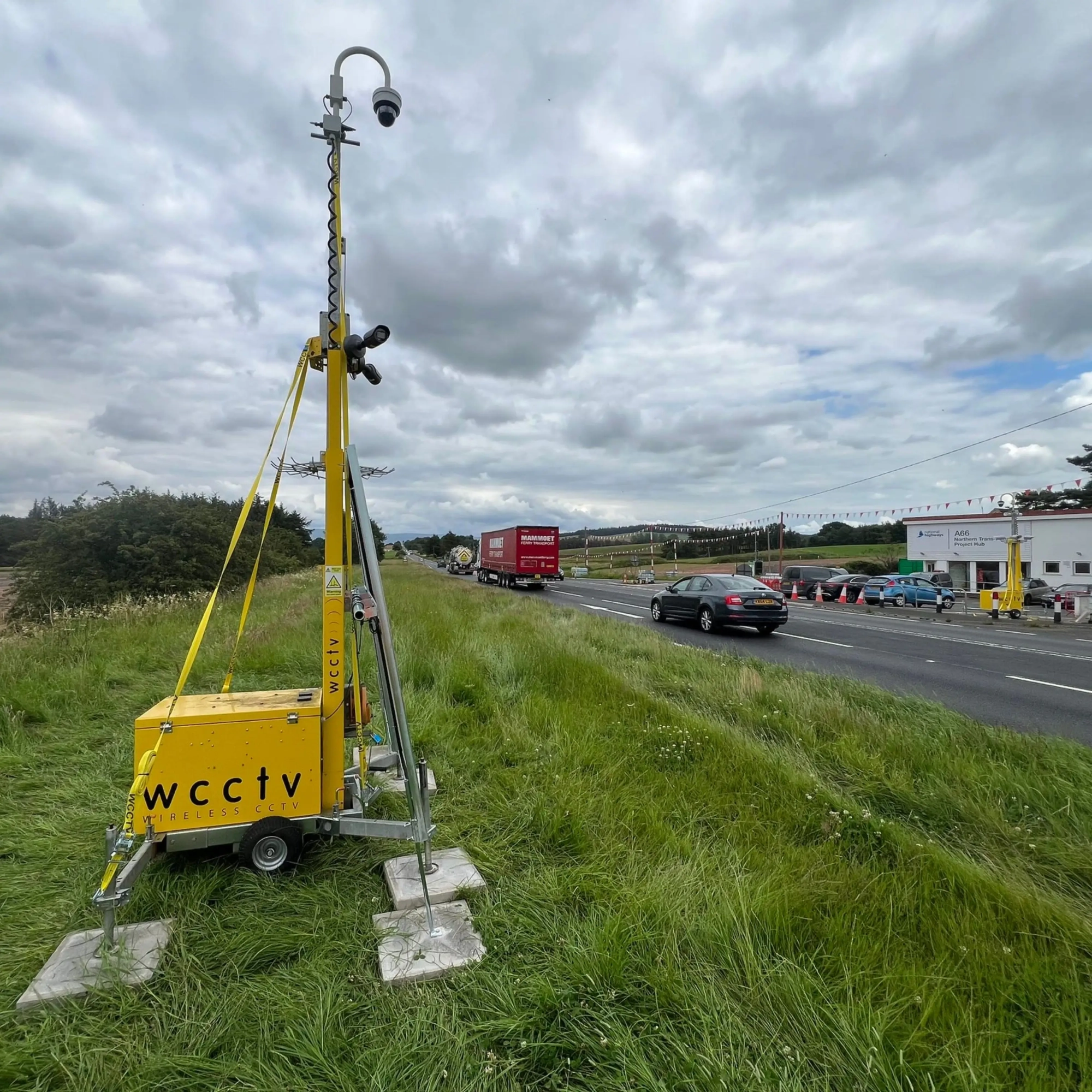
How Effective are Fixed Cameras on Ever-Changing Roadwork Sites?
Fixed security cameras face many limitations when installed on dynamic roadwork sites, creating vulnerabilities that could invite criminal activity:
Installation delays
Traditional security solutions require power supplies, network connections, secure mounting points and other permanent infrastructure. Installations can take days or even weeks to deploy as contractors coordinate with utility companies and/or traffic management teams.
By the time security cameras are operational, the work zone may have moved to a completely different location, making the expensive installation useless.
Mobile CCTV Towers are quick to install, with standard setups up and running within 20 minutes. They operate autonomously, meaning there's no need for extensive trenching, internet connectivity or fixed structures.
Site teams can relocate them quickly without waiting for contractors or specialists, eliminating the wait time as seen with traditional security systems.
Limited coverage
Fixed security devices usually only cover one angle, leaving large parts of your roadwork site unmonitored. Most are "record only", offering no real-time alerts or deterrence, which limits their ability to stop incidents as they happen.
Mobile smart security systems with PTZ cameras, night vision, AI-video analytics and other smart technology integrations like ANPR and Time Lapse Video transform coverage from reactive to proactive. Unlike fixed units, smart devices offer near-360° surveillance and remote access, providing 24/7 uninterrupted monitoring regardless of site layout, lighting or weather conditions.
Power constraints
Traditional security systems often rely on mains power and permanent infrastructure, creating challenges in rural areas where connections are limited or during unexpected power outages. Another risk is metal theft. Criminals often steal copper cabling for its scrap value, destroying your security infrastructure while they're stealing everything else.
Power cuts, cable theft or equipment failures can leave sites completely unprotected for hours, days or weeks before anybody notices.
Modern CCTV systems run entirely on solar power, removing dependence on mains electricity and the risk of outages. Built for off-grid, remote locations, our smart systems feature in-built Heartbeat software, which monitors system health in real-time. If operational errors occur, like camera failure or recording issues, the software alerts operators automatically, who usually resolve up to 90% of issues remotely.
In addition, mobile CCTV Towers using secure 4G/5G networks stream live and recorded footage via fully encrypted networks. Through our Stellifii cloud-based platform, you can remotely access live feeds, recorded video and system diagnostics from any device.
Higher investment
Traditional systems come with high installation costs, often requiring extensive building work, trenching, wiring and permanent infrastructure, which can cost £8,000 or more upfront. Security guards cost upward of £10,000 per month.
For site managers, this upfront investment can be a major financial barrier, especially when security is only needed temporarily.
In contrast, our Temporary CCTV solutions are available on a flexible short- or long-term rental basis. They cost roughly 88% less than manned security guards, require minimal maintenance and are available for as long as you need them - all without the hefty investment or commitment.
The Risks of Relying on Perimeter Fencing Alone
Perimeter fencing is often your first line of defence, but relying on it alone can leave sites exposed and create a false sense of safety.
-
Barrier breaches: Temporary fences are breached easily, either cut with wire cutters or climbed by determined intruders.
-
Installation challenges: Because road construction sites change constantly, boundaries would need to be relocated to ensure sufficient coverage. This can be nearly impossible, especially when roadworks stretch for miles and layouts change daily.
-
Maintenance costs: Rain, wind or storms can cause significant damage to perimeter barriers. This calls for frequent ongoing maintenance or replacements, which can be expensive.
-
Ineffective for internal threat: Fencing cannot prevent theft by workers or unauthorised personnel. Once criminals breach the barrier, there's no internal monitoring to track their movements or activities.
As you can see, while fencing contains work zones, it cannot detect or respond to threats quickly. However, fencing integrated with advanced technologies such as PID systems and professional monitoring offers far stronger protection and faster response.
What Operational, Safety and Financial Risks do Traditional Methods Create
Traditional security systems come with many risks that impact numerous aspects of roadwork operations:
| Risk | Traditional Security Systems | Modern CCTV Towers |
| Operational |
|
|
| Safety |
|
|
| Financial |
|
|
According to ABAX, theft and vandalism now cost the UK's construction industry around £1 billion annually (2025), a £200 million rise since 2020. This spike is largely driven by increased prices of copper, machinery and equipment. When emergency repairs, project delays and higher insurance premiums are factored in, the financial impact is much higher.
6 Benefits of Modern Security Solutions
Smart security systems have changed the game for roadwork protection. Instead of hoping nothing bad happens, you get active monitoring, instant responses and technology that actually works in highway environments.
1. Crime prevention
Modern security systems provide proactive protection by monitoring your site actively and sending instant alerts to NSI Gold Accredited monitoring centres when threats arise. From there, trained security professionals assess the situation in real-time and take immediate action, whether that’s issuing live voice-down challenges or dispatching mobile keyholding teams.
This proactive coverage gives intruders little time to act, keeping your roadwork sites secure and protected both day and night.
2. Rapid deployment
Our standard mobile CCTV Towers are installed within 20 minutes, providing immediate coverage when you need it most. When your crews move to the next section, your security moves with them. No scheduling installation teams or waiting days for new systems to come online.
3. 24/7 Autonomous operation
All of our CCTV Towers, including Traffic Management Towers, run on solar energy for up to 20 weeks without mains electricity or stable internet connections. Weather-resistant designs maintain functionality in harsh conditions, providing uninterrupted protection even in the most remote locations.
4. Advanced technologies
Advanced HD PTZ security cameras deliver near-360° coverage with AI-powered analytics that distinguish genuine threats from false alarms. Other smart devices, such as thermal imaging, PID systems and IoT-based environment sensors, strengthen protection in low-light conditions, cover blind spots and even support ESG reporting.
5. Fully-managed service
From initial site assessment and professional installation to ongoing real-time monitoring and final decommission, our fully-managed security company handles every aspect of your roadwork security needs for your peace of mind.
6. Cost effectiveness
Our modern security measures cost up to 88% less than traditional security systems and manned guards while delivering superior coverage and immediate response. Flexible rental options for temporary or long-term projects provide professional-grade security at a fraction of the cost.
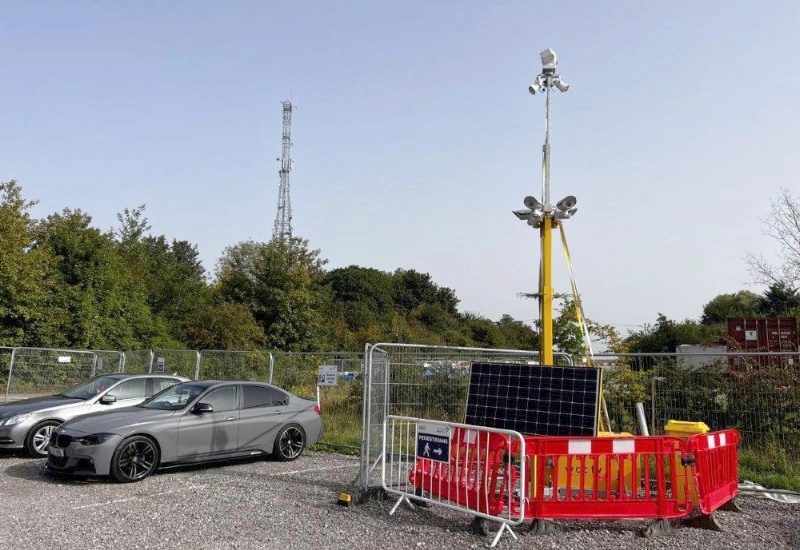
Secure Roadworks with Mobile CCTV Towers Today
Your next roadwork project doesn't have to become another theft statistic. Mobile CCTV Towers are already protecting major infrastructure projects across the UK, from motorway upgrades to smart motorway installations. The technology exists, it's proven and it's available when you need it.
Powered by solar energy, our Towers can operate independently for up to 20 weeks, ensuring consistent protection in remote areas or harsh weather. With high-definition cameras, AI-driven detection and instant alerts to professional monitoring teams, they stop threats before they escalate.
Secure road construction sites the smart way. Contact our team to discuss your roadwork needs today.
